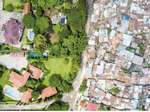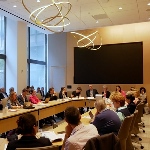| |
|
| |
|
| |
Members of the GCSPF participated at the High-level Political Forum 2019 |
| |
|
| |
The High-level Political Forum on Sustainable Development met from Tuesday, 9 July, to Thursday, 18 July 2019; including the three-day ministerial meeting of the forum from Tuesday, 16 July, to Thursday, 18 July 2019.
The theme was: “Empowering people and ensuring inclusiveness and equality”. The HLPF also reviewed progress towards the SDGs and focus in particular on Goals 4, 8, 10, 13, 16, and 17.
During the ministerial meetings 47 countries carried out Voluntary National Reviews (VNRs).
|
| |
|
| |
|
| |
Agenda 2030: What is wrong with Inequality? |
| |
|
| |

Photo: Johnny Miller. |
Dr. Luise Steinwachs, BftW
“What's wrong with inequality? Should all people be the same?” someone asked me once. Maybe this person was confusing inequality with diversity. Diversity does not necessarily imply exclusion or marginalization. Inequality does.
Inequality is something that shapes and defines one's life. There are always people behind the numbers and percentages. Read more
|
| |
|
| |
|
| |
Technocratic Fiddling While the Planet Burns: Towards a Higher Level of Ambition for the HLPF |
| |
|
| |

Photo: Sergio Chaparro. |
By Kate Donald, CESR
The 2019 HLPF —the global platform for reviewing progress on the SDGs— took place last week at the UN in New York, and in general terms, it was more of the same. Admirable rhetoric, but not much evidence of serious efforts at comprehensive implementation, and a host of major flaws and limitations to contend with. As CESR has observed at previous HLPFs (see 2017 and 2018), the space given to civil society is far too limited, most of the Voluntary National Reviews feel very disconnected from reality, and one leaves with the feeling that most governments are at best timidly tinkering around the edges, making minor adjustments to business-as-usual while the planet burns.
There were, however, three elements that made this year's HLPF somewhat distinct. Read more
|
| |
|
| |
|
| |
Social Watch highlights importance of national civil society reports |
| |
|
| |

Photo: Coordinadora ONGD |
By Elena Marmo, GPW
Every year since the adoption of the 2030 Agenda in 2015, governments are invited to present Voluntary National Reviews (VNRs) on their progress in achieving the Sustainable Development Goals (SDGs) at the High Level Political Forum (HLPF) of the UN. This process is heralded by some as a great opportunity to hold governments accountable to their actions and by others as a beauty contest riddled with misrepresentation and power imbalances. Civil society organizations in many countries produce their own alternative “spotlight reports,” playing with the name of “shadow reports” traditionally given to such independent voices in the Human Rights context.
An event titled “National Reports on 2030 Agenda: What do They (Not) Tell Us?,” jointly hosted by the United Nations Development Program (UNDP), the Committee for Development Policy (CDP), Global Policy Forum (GPF) and Social Watch, explored these tensions and sought to identify opportunities to improve reporting, monitoring, follow-up and accountability in these national review processes. Read more
|
| |
|
| |
|
| |
Reshaping Governance for Sustainability: 2019 “Spotlight” Report Launched at the UN HLPF |
| |
|
| |

Photo: FES |
By Elena Marmo and Sophia McCarron, GPW
“There needs to be an examination of the hardware of the 2030 Agenda, rather than an upgrade of its software” concludes the 2019 Spotlight Report launched on Thursday, 11 July during the High Level Political Forum that reviews the United Nations 2030 Agenda for sustainable development. Under the title of “Reshaping governance for sustainability”, the civil society report explores transforming institutions, shifting power and strengthening rights. The launch event showcased the ideas presented by a variety of the report’s authors. Read more
|
| |
|
| |
|
| |
HLPF Training workshop: “Participatory and Inclusive tools to build capacities in leaving no one behind” |
| |
|
| |
As part of the 2019 edition of the SDGs Learning, Training & Practice – a series of capacity building and knowledge workshops held at the HLPF and co-hosted by the Division for Sustainable Development Goals, UN Department of Economic and Social Affairs (UN DESA/DSDG) and the United Nations Institute for Training and Research (UNITAR) - a group of NGOs and Universities (some of which are members of the Global Coalition on Social Protection Floors) came together to present their “Participatory and Inclusive tools to build capacities in leaving no one behind”, Thursday July 11th, 2019. Through interactive talks, activists, academics and people with a direct experience of disability or poverty powerfully shared their respective work and research aiming at bringing the voices of the most excluded and marginalized segments of society globally. Read more
|
| |
|
| |
|
| |
Notes on the HLPF 2019 |
| |
|
| |
By Barry Herman
Social Justice in Global Development
There is a growing appreciation that the SDGs, if not yet the 2030 Agenda writ large, are less than they are made out to be. Nevertheless, they embody the only international discussion on development and remain politically embraced by international development organizations, governments and much of civil society. The following draws from comments made in different meetings. Read more
|
| |
|
| |
|
| |
Notes on the HLPF 2019 |
| |
|
| |
By Sylvia Beales Gelber, APSP
The Stakeholder Group on Ageing event ‘Confronting ageism and empowering older people to ensure social, economic and political inclusion of all’ was held on 9th July, the key message was ‘Achieving the SDGs means dismantling ageism’. The event can be watched here and a report is available here.
VNR LAB 3: “Leaving no one behind” – Inclusive implementation and reporting was held on 10th July. The Lab focussed on how public and civic institutions can create/strengthen mechanisms to ensure inclusive processes, including decision-making in the implementation of SDGs, and in specific VNR preparatory and reporting processes at the national and local levels. A key conclusion was that LNOB principles need to be mainstreamed into all policies and sectors and should be more effectively used as inclusive mechanisms at the national and local levels. The report is available here and the intervention is here.
|
| |
|
| |
|
